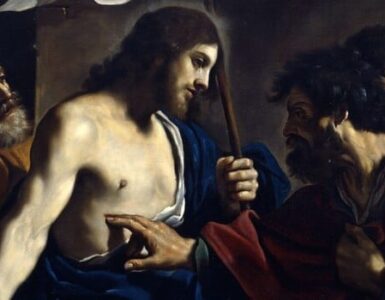Every year about nine months before the Solemnity of the Nativity, we celebrate the Solemnity of the Annunciation. In Against Heresies (Book III, Chapter 22), St. Irenaeus describes Mary’s fiat to the Archangel Gabriel as the act that undoes the knot of Eve’s disobedience. In disobeying God, both Adam and Eve bequeathed to their descendants the three-fold concupiscence St. John identifies in his first epistle: Lust of the Flesh, Lust of the Eyes, and the Pride of Life (1 John 2:16).
During the temptation in the desert, Jesus is among “the wild beasts” (Mark 1:13), just as Adam had been. As the New Adam, Christ recapitulates all humanity within Himself and overcomes man’s concupiscence by rejecting Satan’s temptations (Matthew 4:2-11, Luke 4:2-13).
Yet, two persons were complicit in the Fall. So if the New Adam overcomes concupiscence, shouldn’t the New Eve as well? After all, the first Eve initiates eating the fruit from the Tree of Knowledge of Good and Evil. She saw the fruit was “good for food,”—lust of the flesh—“a delight to the eyes,”—lust of the eyes—and could “make one wise”—the pride of life. In the Annunciation and in her Magnificat, Luke reveals Mary as the New Eve, who, through her exercise of free will, overcomes the three-fold concupiscence and establishes herself as a perfect model of holiness.
John’s Gospel identifies Mary as the New Eve as well, when Jesus addresses her as “Woman” during both the Wedding at Cana and at the Crucifixion. Adam bestowed this title on Eve at her creation, and Jesus bestowed the same title on Mary in these moments.
Lust of the Flesh is the inordinate desire to satisfy bodily pleasure.It’s likely Mary has overcome it already when she says, “How can this be since I have no husband” (Luke 1:34, RSVCE). Tim Staples points out in his book, Behold Your Mother, that this verse is evidence of the perpetual virginity of Mary. If Mary intended to have a marriage which included biological children, her response to the announcement of the conception of a child in her womb would have been, “Of course. Joseph and I will have children together.” “I have no husband” suggests that Mary never intended to have marital relations, and that she wasn’t the only one with that expectation. In the Protoevangelium of James, when the priests discover Mary is pregnant, they accuse Mary and Joseph of a “grievous crime” for they understood that Mary, on account of being dedicated to the temple, was never to have marital relations.
The Life of St. Joseph, a revelation in the 1700s to Maria Cecilia Baij, OSB, mentions that Mary had taken a vow of virginity and was living in the temple when the priests chose Joseph as her husband. The book describes their marriage as purely spiritual, without conjugal relations, for both Mary and Joseph had dedicated themselves to true intimacy with God. Only one who has conquered the lust of the flesh would seek a spiritual marriage.
Lust of the Eyes is the inordinate desire for possession of material things. A heart so consumed has no space for heavenly ones. St. Luke shows us that the Holy Family was financially poor. No princes attended Our Lord’s birth, only simple shepherds. His parents offered two turtledoves at His circumcision (Luke 2:22-33)—the offering of the poor (Leviticus 12:8). Before anyone thinks she simply didn’t marry well, let’s look at an Old Testament prefigurement.
In the book of Judith, the Assyrian commander Holfernes uses his army to gobble up acres and acres of arable land. In an agrarian society, that’s where the wealth resides, so he is the epitome of greed. When he threatens the Jews, Judith enters his bedchamber under a ruse, beheads him (Judith 13:6-10), and ends his avaricious conquest. Judith donates the spoils she took from Holfernes to the temple. Before she dies, she gives her own wealth.
The principle of typological escalation makes it reasonable to infer Mary to have been more generous. Following the principle, Mary is far more generous than Judith, for Judith gave away temporal things. Mary, as a young girl, is willing to give away the most valuable commodity the world has ever known—her own son for the life of the world.
The Pride of Life deceives into seeking attention for the sake of attention, preferably in splashy spectacles. It is the worst sin because it spawns all the others. Mary’s fiat, “Let it be done to me according to your will,” is peak humility. In the Garden of Eden, Eve acts according to her selfish interest; when told of the fruit that would grow within her womb, Mary visits her cousin Elizabeth and serves her for three months. When she learned of the wine shortage at the Wedding in Cana, she has Jesus replenish it instead of allowing the groom to suffer embarrassment. Rather than draw attention to herself as the instigator, she’s quickly out of the picture.
She reveals her interior disposition through her Magnificat: “My soul magnifies the Lord.” The word for “Lord,” in Greek is kyrion, which is used when speaking of God. In carrying the Savior of the world, she credits the Lord God for the miracle, not herself. She recognizes her blessedness (Luke 1:42) has its source through God’s grace.
Mary had opportunities to turn her back on God, especially when her Son hung on the cross. Nevertheless, she remained faithful and merited her role as the Mother of the Church. She accomplished this as a merely human person. Just as Eve freely chose to disobey God and eat from the Tree of the Knowledge of Good and Evil, Mary freely chose to obey and glorify God.
When we are baptized, God washes away Original Sin, but we still have the three-fold concupiscence which, if left unchecked, leads us to sin. The good news is that the Church, following the example of Mary, our mother, has had the antidote for centuries. Fasting refrains us from overindulging in activities that provide only physical satisfaction. Charity redirects a portion of our wealth to the service of God and to the care of those less fortunate. Prayer defeats the sin of pride as we acknowledge God and supplicate Him for the fortitude to overcome all our sins. This practice is how we honor our mother.
If we desire salvation, we must continually choose the good and forsake the evil. Mary, our spiritual mother, will intercede for us to overcome the three-fold concupiscence that has metastasized in so many souls. What mother who loves her children would ever say no to us growing closer to our Father? She wants us to join her in Heaven. Following her example and practicing a life of virtue places us on the path join Mary, our spiritual mother, in undoing the effects of the Fall and merit with her the joys of Heaven.
di Cosimo, P. (1485-1505). Incarnation of Jesus [painting]. Retrieved from Wikimedia Commons.











